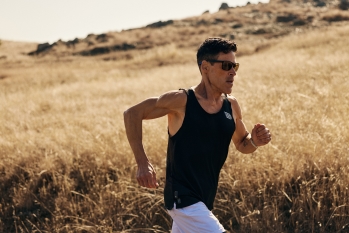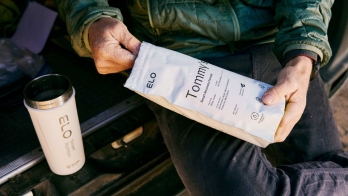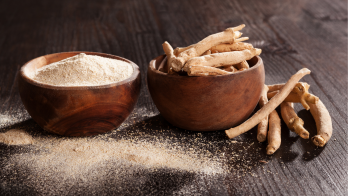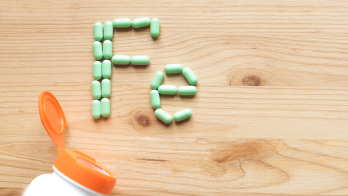How to get hydrated fast to reduce muscle soreness and boost recovery
Whether you’re a fitness enthusiast or an elite athlete, hydration levels can make or break your performance and recovery. Here’s how to get hydrated fast so you can reduce muscle soreness, improve cognition, and sleep better.
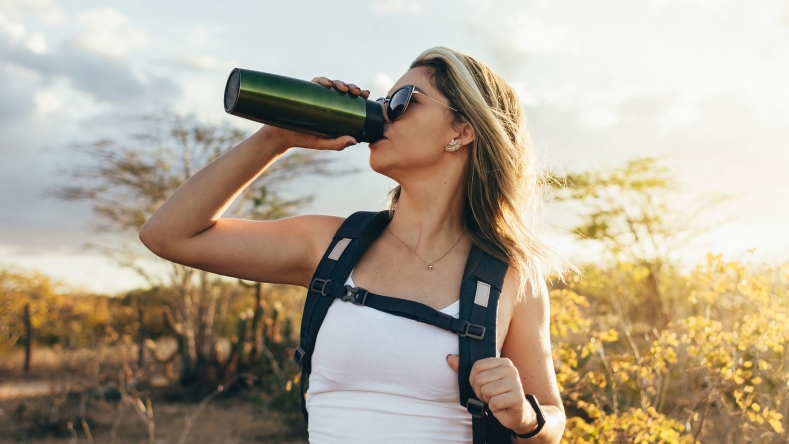
Water is a fundamental aspect of human existence and plays a paramount role in your health, activity levels, and well-being. There are numerous benefits to staying hydrated, but emerging research shows that getting adequate water throughout the day can have a positive impact on muscle soreness, cognition, sleep quality, and thermoregulation–all of which are important for athletes and fitness enthusiasts alike.
In this article, we are doing a deep dive into the intricate relationship between hydration, exercise, and performance to better understand the significant impact that it can have on your physical capabilities. So, grab a glass of water and join us on this enlightening journey to unleash your full potential through the power of hydration.
The importance of water and hydration
Water is critical for survival, and plays a vital role in our overall health as it helps regulate body temperature, lubricate joints, maintain fluid balance, transport nutrients, remove waste, circulate blood, and improve cardiovascular and digestive health [ 1 2
Since water is necessary for many bodily functions, it’s important to stay hydrated throughout the day to replace any body fluids lost through sweating, exhaling, and eliminating waste. Furthermore, notable research shows that adults who stay well-hydrated appear to be healthier, develop fewer chronic conditions, and live longer compared to those who may not get sufficient fluids [ 3
If you lose more fluids than you take in, you run the risk of becoming dehydrated which can lead to many negative side effects (such as sweating, vomiting, and experiencing diarrhea). Studies have also found that mild dehydration can lead to impaired cognitive performance and shorter sleep durations [ 4 5
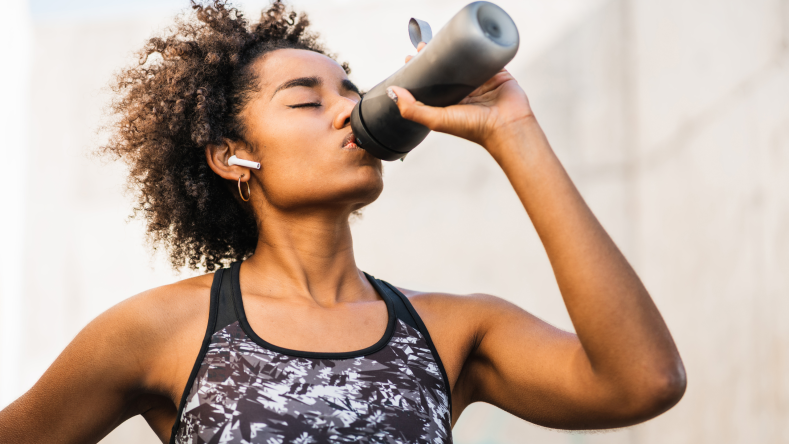
How many bottles of water should I drink a day?
Experts have determined that an adequate fluid intake for men is ~15.5 cups (3.7 liters), and ~11.5 cups (2.7 liters) for women [ 6
However, these numbers could change depending on your activity levels, climate conditions, body size, and if you’re pregnant or breastfeeding. Talk with a healthcare professional to see how much water you should drink per day.
How long does it take to get hydrated?
The time it takes to get hydrated depends on various factors, including your level of dehydration and how effectively you replenish fluids.
For example, it can take anywhere from a few minutes to several hours to fully hydrate your body, but you may start to feel some improvement in your hydration status within 30 minutes - 1 hour after drinking fluids.
Impact of electrolytes on hydration status
Electrolytes are minerals that carry an electric charge and help keep your body functioning properly. They do this by balancing the amount of water in your cells, keeping your pH levels stable, moving nutrients into your cells, removing waste from your cells, and ensuring your brain, heart, muscles, and nerves are performing well [ 7
Furthermore, electrolytes play a crucial role in hydration, as they help regulate fluid balance, support nerve and muscle function, and maintain pH balance. Replenishing electrolytes along with fluids is important to restore hydration levels effectively.
Common natural electrolytes include sodium, potassium, chloride, magnesium
What is the best way to get electrolytes?
Electrolyte balance is essential for your body to function properly. Not getting enough electrolytes can disrupt your fluid balance, leave you feeling tired or weak, and have significant consequences on athletic performance. You can replenish electrolytes through the following dietary sources.
Sodium: Pickled foods, eggs, cheese, and table salt
Chloride: Table salt
Potassium: Bananas, avocado, spinach, broccoli, beans, and lentils
Magnesium: Greens, nuts, seeds, dry beans, and whole grains
Calcium: Dairy products, fortified dairy alternatives, and green leafy vegetables
In addition to food sources, you can also consider water with electrolytes, sports drinks, or electrolyte-enhanced beverages if you engage in intense physical activity, sweat excessively, or experience prolonged periods of dehydration. However, it's important to note that these beverages may contain added sugars and other additives, so it's best to read the labels and choose options that align with your dietary needs and preferences.
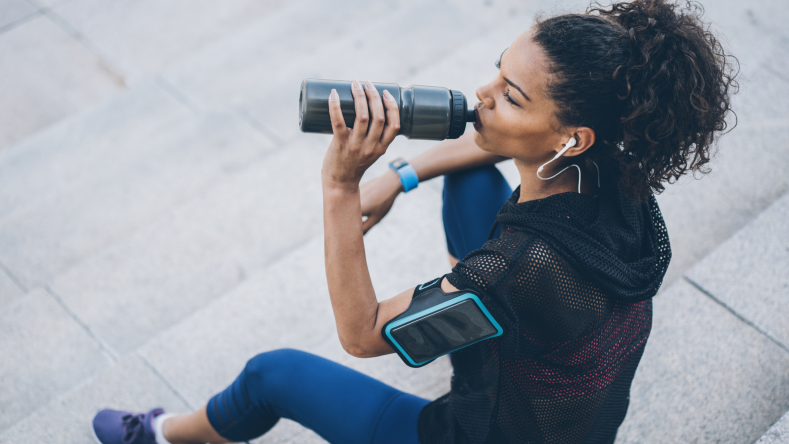
Connection between hydration, performance, and recovery
Studies continue to show that maintaining proper hydration levels is paramount for athletes and active people alike, as it plays an important role in performance, injury prevention, and recovery [ 8
Let’s take a deep dive into some research to further understand the link between hydration, performance, and exercise.
Better temperature regulation
Because exercise generates internal heat, your body starts to sweat to cool down and compensate for the rise in core temperature. And, since water helps keep your body's temperature within a normal range, it explains why adequate hydration is one of the best ways to combat heat illnesses like overheating, heat exhaustion, and heat stroke.
Furthermore, studies have found that someone who is well-rested and hydrated has a better chance of controlling body temperature during extreme exercise compared to those who are dehydrated [ 9
Enhanced performance
Proper hydration directly influences muscle function and can significantly impact fatigue levels. When your body is dehydrated, your muscles tend to fatigue faster, which can lead to a decrease in strength, endurance, power, and overall athletic performance [ 8
Research also shows that acute dehydration can impair muscular strength and endurance, and may increase fatigue perception, both of which can lead to a decrease in performance and recovery [ 10 11 12
Improved mental focus and cognition
Studies indicate that dehydration can impair cognitive function, fatigue, attention, and reaction, all of which are critical for sports performance [ 13 14
Better sleep quality
Sleep is a vital component of the recovery process, as it facilitates both physical and mental restoration. Emerging evidence shows that hydration levels can do wonders for sleep and muscle recovery since dehydration can induce stress, lead to sleep impairment, and affect the readiness for and recovery from exercise [ 15 16
If you have trouble falling or staying asleep, here are some
safe sleep supplements
that may help.
4 strategies for how to get hydrated fast
Now that we’ve covered the importance of hydration for recovery, performance, and overall wellness, here are the best science-backed strategies for how to get hydrated fast.
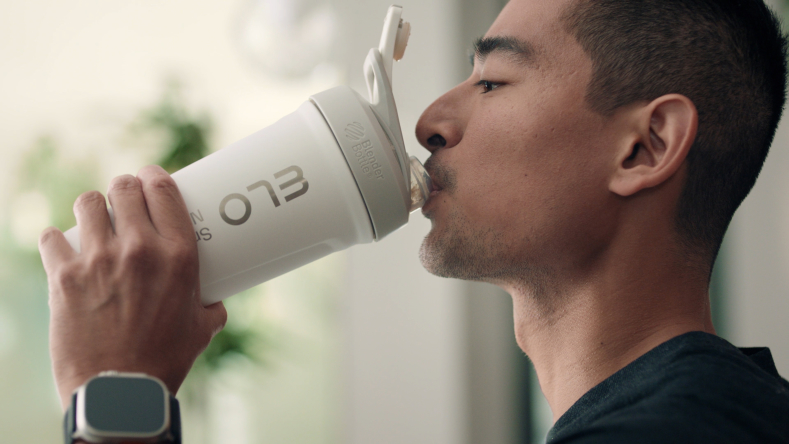
1: Consider post-workout beverages
After an intense exercise session, opt for recovery drinks that can replenish fluids and electrolytes, and provide nutrients for recovery. Look for options that contain a balanced combination of carbohydrates, protein, and electrolytes.
Elo Smart Protein is a good post-workout beverage because it includes protein (for muscle recovery) and other beneficial nutrients (such as turmeric, ashwagandha, electrolytes, and carbohydrates) that can further boost performance and recovery.
Try it out for yourself!
2: Consume hydrating foods
Water reigns supreme when it comes to hydration, but it’s not the only player in the game. Here are some fruits and veggies to consider for how to stay hydrated without drinking water:
Watermelon
Cucumber
Strawberries
Lettuce
Oranges
Celery
Radishes
Tomatoes
Zucchini and summer squash
These foods not only provide hydration, but they also contain important nutrients and electrolytes to help replenish your stores.
3: Carry hydration packets
If you’re a long-distance runner or cyclist, you may want to consider keeping hydration packets on hand. These powders often contain electrolytes (like sodium, calcium, and potassium) to help stave off dehydration and keep you hydrated throughout your activity.
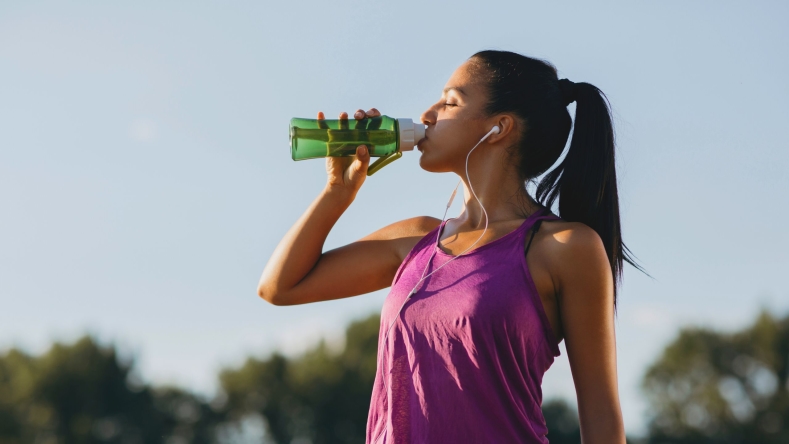
4: Replenish fluids before, during, and after a workout session
Water is one of the best pre-workout drinks you can have, and for good reason–research has found that dehydration can decrease your strength, power, and high-intensity endurance during a workout [ 17
To avoid dehydration and to further optimize your workouts, experts recommend the following [ 18
Pre-workout: drink 8 oz. of water at least 30 minutes before exercise.
During workout: drink 16 oz. of water during a 1 hour workout, and electrolyte-rich sports drinks for activities that last <90 minutes.
Post-workout: drink 16 oz. of water within 30 minutes of finishing exercise.
Everyone's hydration needs can vary, so it's essential to find a balance that works for you. Experiment with different hydration strategies during training sessions to determine what works best for your body.
Symptoms of dehydration
Dehydration occurs when your water intake is less than your output. You can become dehydrated if you lose more fluids than you take in, which may be caused by sweating, vomiting, experiencing diarrhea, or taking certain medications.
Common symptoms of dehydration may include [ 19
Thirst
Dry mouth and throat
Dark-colored urine
Fatigue
Dizziness or lightheadedness
Headache
Dry skin
Muscle cramps
Rapid heartbeat
Impaired cognitive function
Who is at risk for dehydration?
Anyone can become dehydrated, but certain groups are particularly at risk. These include [ 20
Babies and infants
Older adults
People with diabetes or alcoholism
Athletes
Pregnant women
Foods and drinks that can cause dehydration
Certain foods and drinks (such as caffeinated beverages, alcohol, and salty or processed foods) can have a diuretic effect, meaning they might increase urine production and potentially contribute to dehydration. However, it's important to note that the diuretic effect of these items is generally mild, and their impact on hydration varies from person to person.
Summary
Whether it's a grueling workout session or a high-stakes athletic competition, maintaining proper hydration levels becomes paramount for sustaining endurance, maximizing strength, and achieving peak performance. By neglecting hydration, athletes and fitness enthusiasts risk compromised performance and increased susceptibility to injuries.
Some strategies for how to get hydrated fast include carrying hydration packets, drinking post-workout beverages, getting enough fluids, and choosing hydrating foods.
Disclaimer: The text, images, videos, and other media on this page are provided for informational purposes only and are not intended to treat, diagnose or replace personalized medical care.
Key takeaways
Maintaining hydration supports muscular function, endurance, and overall athletic performance.
Dehydration can impair cognitive function, fatigue, attention, and reaction, all of which are critical for sports performance [
13
,14
].Electrolyte-rich foods and beverages are best for replenishing hydration levels, whereas caffeinated beverages, alcohol, and salty or processed foods can contribute to dehydration.
References
Jéquier, E., & Constant, F. (2010). Water as an essential nutrient: the physiological basis of hydration. European journal of clinical nutrition, 64(2), 115–123.
https://doi.org/10.1038/ejcn.2009.111
Migala, J., George, N., Lawler, M., Salomon, S. H., Kennedy, K., By, Migala, J., & Haupt, A. (n.d.). Functions of water: 7 health benefits. EverydayHealth.com.
https://www.everydayhealth.com/water-health/water-body-health.aspx
U.S. Department of Health and Human Services. (n.d.). Good hydration linked with longevity. National Heart Lung and Blood Institute.
https://www.nhlbi.nih.gov/news/2023/good-hydration-linked-longevity
Riebl, S. K., & Davy, B. M. (2013). The Hydration Equation: Update on Water Balance and Cognitive Performance. ACSM's health & fitness journal, 17(6), 21–28.
https://doi.org/10.1249/FIT.0b013e3182a9570f
Rosinger, A. Y., Chang, A.-M., Buxton, O. M., Li, J., Wu, S., & Gao, X. (2018). Short sleep duration is associated with inadequate hydration: Cross-cultural evidence from US and Chinese adults. Sleep, 42(2).
https://doi.org/10.1093/sleep/zsy210
Mayo Foundation for Medical Education and Research. (2022, October 12). How much water do you need to stay healthy?. Mayo Clinic.
https://www.mayoclinic.org/healthy-lifestyle/nutrition-and-healthy-eating/in-depth/water/art-20044256
U.S. National Library of Medicine. (n.d.). Fluid and electrolyte balance. MedlinePlus.
https://medlineplus.gov/fluidandelectrolytebalance.html
Judge, L. W., Bellar, D. M., Popp, J. K., Craig, B. W., Schoeff, M. A., Hoover, D. L., Fox, B., Kistler, B. M., & Al-Nawaiseh, A. M. (2021). Hydration to Maximize Performance and Recovery: Knowledge, Attitudes, and Behaviors Among Collegiate Track and Field Throwers. Journal of human kinetics, 79, 111–122.
https://doi.org/10.2478/hukin-2021-0065
Administrator. (2015, May 17). How thermoregulation can give athletes an edge (mission athletecare). Korey Stringer Institute.
https://ksi.uconn.edu/2015/05/17/how-thermoregulation-can-give-athletes-an-edge-mission-athletecare/
Barley, O. R., Chapman, D. W., Blazevich, A. J., & Abbiss, C. R. (2018). Acute Dehydration Impairs Endurance Without Modulating Neuromuscular Function. Frontiers in physiology, 9, 1562.
https://doi.org/10.3389/fphys.2018.01562
Harris, P. R., Keen, D. A., Constantopoulos, E., Weninger, S. N., Hines, E., Koppinger, M. P., Khalpey, Z. I., & Konhilas, J. P. (2019). Fluid type influences acute hydration and muscle performance recovery in human subjects. Journal of the International Society of Sports Nutrition, 16(1).
https://doi.org/10.1186/s12970-019-0282-y
Cleary, M. A., Sitler, M. R., & Kendrick, Z. V. (2006). Dehydration and symptoms of delayed-onset muscle soreness in normothermic men. Journal of athletic training, 41(1), 36–45.
Zhang, N., Du, S. M., Zhang, J. F., & Ma, G. S. (2019). Effects of Dehydration and Rehydration on Cognitive Performance and Mood among Male College Students in Cangzhou, China: A Self-Controlled Trial. International journal of environmental research and public health, 16(11), 1891.
https://doi.org/10.3390/ijerph16111891
Zhang, J., Zhang, N., Du, S., He, H., Xu, Y., Cai, H., Guo, X., & Ma, G. (2018). The Effects of Hydration Status on Cognitive Performances among Young Adults in Hebei, China: A Randomized Controlled Trial (RCT). International journal of environmental research and public health, 15(7), 1477.
https://doi.org/10.3390/ijerph15071477
Ellis, R. T., Jiwan, N. C., Trevino, I. R., Appell, C. R., Lewis, C., Sterling, R., Ky, A. T., Rolloque, J.-J. S., Keefe, M. S., Dunn, R. A., Sekiguchi, Y., & Luk, H.-Y. (n.d.). The effect of hydration status on sleep quality: A pilot study. TopSCHOLAR®.
https://digitalcommons.wku.edu/ijesab/vol2/iss15/20/
Malhotra R. K. (2017). Sleep, Recovery, and Performance in Sports. Neurologic clinics, 35(3), 547–557.
https://doi.org/10.1016/j.ncl.2017.03.002
Judelson, D. A., Maresh, C. M., Anderson, J. M., Armstrong, L. E., Casa, D. J., Kraemer, W. J., & Volek, J. S. (2007). Hydration and muscular performance: does fluid balance affect strength, power and high-intensity endurance?. Sports medicine (Auckland, N.Z.), 37(10), 907–921.
https://doi.org/10.2165/00007256-200737100-00006
Lane, E. (2019, February 25). Here’s how much water you should drink before, during, and after a workout. Men’s Health.
https://www.menshealth.com/fitness/a19521706/drink-water-before-workout/
Dehydration and heat stroke. Dehydration and Heat Stroke | Johns Hopkins Medicine. (2021, August 8).
https://www.hopkinsmedicine.org/health/conditions-and-diseases/dehydration-and-heat-stroke
Dehydration symptoms and treatments. Illnesses & conditions | NHS inform. (n.d.).
https://www.nhsinform.scot/illnesses-and-conditions/nutritional/dehydration

